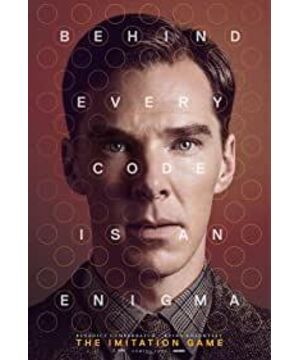"People worship violence because people get gratification from it."
We can understand its anti-war connotation from the thoughts of the whole film, and we can also see his fierce opposition to campus bullying from the story of the young Alan; this line has been said several times in Alan Turing's mouth, Each appearance reminds us of its meaning, and the shock spirals upwards.
Director Morten Tydum's film The Imitation Game takes 110 minutes to show us the great and unfortunate life of the genius mathematician Alan Turing.
The whole film takes the story of Alan's arrest in real time and space (reality) as the main line and flashes back from the story of his first entry into the British army's cryptographic system to his success in inventing the "Turing Machine" and using it to successfully detect the German fascist British. The whole process of helping the British army turn the tide of the war by using the Gemma code; also intersperses the story of Alan being bullied at school when he was a teenager, and his first meeting Christopher, the teenage partner who changed his life, to when he learned that Christopher was a The whole process of psychological changes after the death of the disease; at the end of the film, the story returns to reality, because of the British government's harsh policy on homosexuals at that time, to keep his most important Turing machine, Alan chose to bear the pain of chemical castration alone, saving countless compatriots, but it is difficult to gain the understanding and respect of the society, Alan's life has been drawn a tragic footnote.
Overall, this is my intuitive feeling about the narrative of this film. As a biographical film of a great man, it is often difficult to achieve a good balance if the story is told comprehensively, and it will lack some drama and artistry, and sometimes it will get the opposite result. The "narrative method" plays one of the most important roles in both literature and drama, because in the final analysis, whether it is a movie or a novel, it is a process of telling a story. The three most important parts of The Imitation Game It is a narrative technique, but it can play different roles (tell different parts of the story), and finally be connected and merged into a whole, thus winding the already rich storyline into a beautiful knot.The direct part shows the mystery of the protagonist Alan, and the flashback helps the audience to uncover the mystery of Alan. However, in the dark, we still cannot see the real image of the character behind the veil, and the interlude is like reflecting everything in the house. To the bright light in the eyes of the audience - gently revealing the history of everything that made Alan.
What happened to a genius?
This is a question with three questions in one sentence, and in my opinion, it is also the main structure of the play of this film. What happened to the protagonist in real time and space? This question forms the storyline throughout the film; what has the protagonist experienced? This question is what this biographical film is about - the great history of Alan Turing; what did the protagonist go through to become him? This question constitutes a subjective and objective answer to the audience about Alan's quality as a "human".
And Alan Turing gradually became complete in this invisible question and answer and entered the memory of every audience.View more about The Imitation Game reviews











